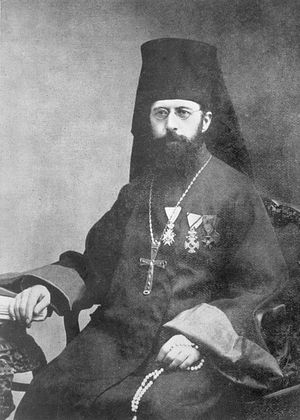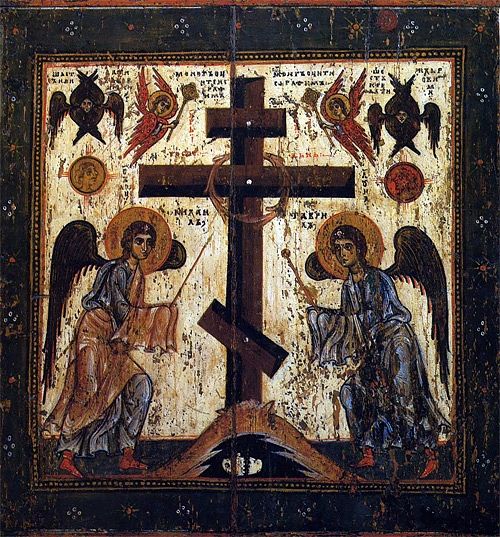Shall some speak these days of love? Shall they now speak, when the fruit of enmity has ripened in the vineyard of the Beloved; when the earth trembles at the horror, hearts of stone are rent asunder, and the eye of heaven is darkened with deep indignation? Shall they now speak of love for the world, when also the Son of God, suffering in the world, is abandoned bereft of comfort, and His prayerful cry, My God, my God, why hast Thou forsaken me? (Mt. 27:46), is left without response?
Homily on Great Friday
 We offer our readers our English translation of one of the most acclaimed patristic works dedicated to the significance of our Lord Jesus Christ’s Sacrifice on the Cross. This homily was given by Archimandrite Philaret (Drozdov), the future Metropolitan Philaret of Moscow, in the St. Alexander Nevsky Lavra in St. Petersburg on Holy Friday, 1816.
We offer our readers our English translation of one of the most acclaimed patristic works dedicated to the significance of our Lord Jesus Christ’s Sacrifice on the Cross. This homily was given by Archimandrite Philaret (Drozdov), the future Metropolitan Philaret of Moscow, in the St. Alexander Nevsky Lavra in St. Petersburg on Holy Friday, 1816.
For God so loved the world (Jn 3:16)
Irish Monasticism and the Paschal Controversy
 From the history of the Irish Church in the seventh century
From the history of the Irish Church in the seventh century
The main theological dispute in sixth and seventh-century Ireland was the controversy over the correct date for Pascha. The point is that from the time of St. Patrick (c. 390 – c. 461 or 492?) the Celtic Churches of Ireland, Britain (especially of Wales) and among the British emigrants to mainland Armorica (now Brittany) used the paschalia based on the eighty-four-year cycle, which meant that Easter could fall at the earliest on the fourteenth day of Nisan and at the latest on the twentieth day of Nisan (according to the lunar calendar), or, in other words, between March 25 and April 21 (according to the solar Julian calendar). This method of calculating the day of the Resurrection of Christ was different from those of Rome and Alexandria; according to the latter, the Christian Pascha could never fall prior to the Jewish Passover, while the former ignored this precaution. The Irish tried to prove the correctness of their paschalia by making references to the apocryphal acts of the Council of Caesaria and a treatise on time of the Paschal celebrations, attributed to St. Anatolius of Laodicea.
Sincere Religion
 On this commemoration day of St. Sebastian Dabovich, we present a chapter from his work, The Lives of the Saints. His words ring just as true today as they did when he wrote them in the late nineteenth century.
On this commemoration day of St. Sebastian Dabovich, we present a chapter from his work, The Lives of the Saints. His words ring just as true today as they did when he wrote them in the late nineteenth century.
We live in a peculiar age. No time has ever dawned upon the earth like the present era. Startling developments in the world of truth keep the minds of men, to some extent, constantly reaching out after it. More light! greater knowledge! is now the almost universal cry. Great discoveries in science have opened many new and hitherto unknown avenues to the greater physical development of the human family; and at the same time it may be said to be true, that the mental development of man has, to some extent, kept pace. In all this onward movement in the world of material and mental research, men turn to the representative of God among men, and inquire if in the religious world there are any developments; and we find that there are many and great changes in the religious world. Mark you—many and great changes in the world of religious opinion, but very little development in religious life!
Bishop Dr. Jovan (Puric): Moderna and Orthodoxy
The modern world functions as a single planetary market on which everything is sold and bought: from physical territories, possessions and objects, to virtual “electronic money” and stock market shares, to identity and sovereignty, memory, soul, even past and future! The principle of a market economy emerged as universally valid, possessing not only economic principles but also for comprehensive human life. The overall life of humanity, and every individual human being, in all timezones, depends on the impersonal and ruthless laws and mechanisms of market economics, the aggressive dynamics of supply and demand, production and consumption, input and output. The spirit of this modern consumer civilisation, “the civilization of turning a human being into a thing”, is the spirit of greed and lust, “insatiable hunger for things and possessing them”.
LENTEN SYNAXARION: Sunday of the Veneration of the Cross
 Let all the earth venerate the Cross, through which it has learned to worship Thee, the Word.
Let all the earth venerate the Cross, through which it has learned to worship Thee, the Word.
On this third Sunday of the Great Fast we celebrate the Veneration of the precious and life-giving Cross. Since during the forty days of the Fast we are also in a way crucified, mortified to the passions, contrite, abased and despondent, the precious and life-giving Cross is offered to us as refreshment and confirmation, calling to mind the Passion of our Lord Jesus Christ, and comforting us. If our God was crucified for our sake, how great should be our effort for His sake, since our afflictions have been assuaged through the Lord’s tribulations, and by the commemoration and the hope of the Cross of glory. For as our Savior in ascending the Cross was glorified through dishonor and grief; so should we also endure our sorrows, in order to be glorified with Him. Also, as those who have traveled a long hard road, weighed down by the labors of their journey, in finding a shady tree, take their ease for a moment and continue their journey rejuvenated, so now in this time of the Fast, this sorrowful and laborious journey, the Holy Fathers have planted the life-giving Cross, for our relief and refreshment, to encourage and make easier the labors that lie ahead. Or as when there is a royal procession, the king’s scepter and banners precede him, he then appears himself, radiant and joyous in his victory, causing his subjects to rejoice with him.

